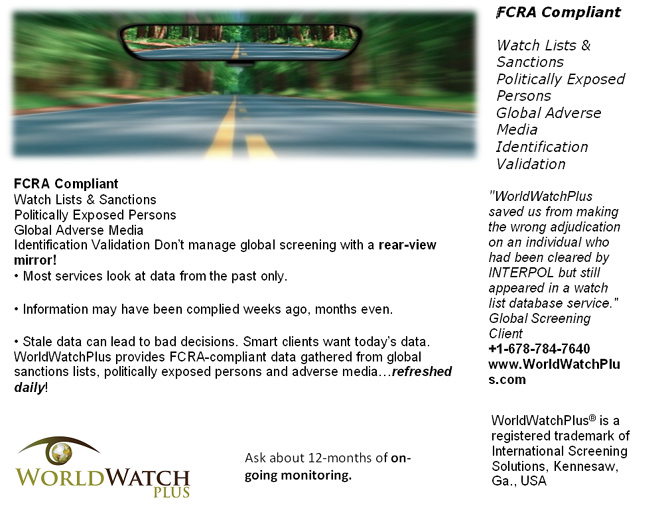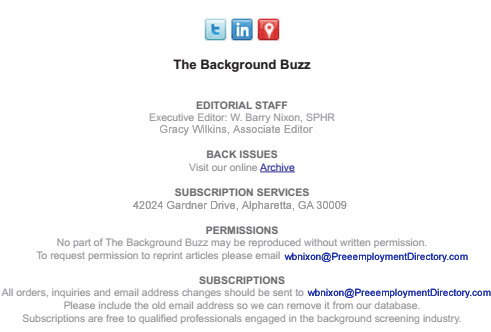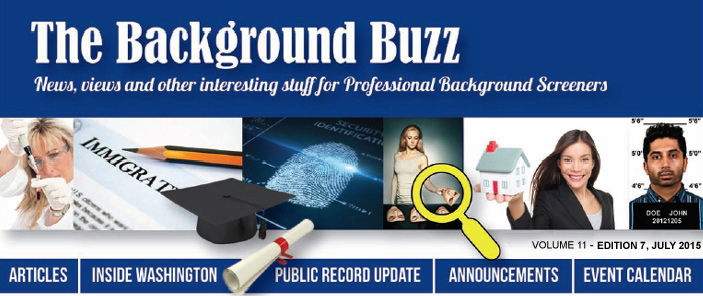 |
Selamat sore ('Good Day' in Sumatra Selamat sore (sounds like: 'sor-ee') I am discovering the joys of being close to family and having very young grandchildren. I have a big personal favor to ask of our readers. The school that my granddaughter, Delaney Nixon, attends is having a contest to see which child can get post cards from the most states. Would you please mail a post card to Sunbrook Academy at Legacy Park, c/o Delaney Nixon, 3871 Jiles Road, Kennesaw, Ga 30144. You can write 'At the request of Barry Nixon.' Your help will be greatly appreciated. If you let me know you sent a card I will buy you a cup of coffee the next time I see you. Thanks for your support. I am happy to announce we have released the results of our Annual 2015 Employers Background Screening Practices Survey which was taken at the recent SHRM Annual Conference and it has some surprising insights for firms in the industry. Good news for the industry. according to IBIS World Facts Background Screening Report the industry is expected to grow in line with the economy during the 10 years to 2019. To help you take advantage of this growth period we now have two great ways for background screening firms to reach out to the Human Resources community. First, there is our industry leading 2015-16 Annual Background Screening Industry Resource Guide which is the premier publication in the industry which we launched at the recent SHRM Annual Conference. We will begin distributing the Guide to 30,000 HR Managers shortly. It's a great way to reach out to your target market. Second, we have launched our new HR Direct Mail Service which will make HR contact information available for over 100,000 HR Managers. We are selling our HR email list on a state by state basis. Click here to read about the service. Email me at wbnixon@Preemploymentdirectory.com to get your sample of up to 100 HR email contacts. There is a lot happening on Capital Hill that will impact our industry. Be sure to read this month's Washington Report which shows a lot of activity regarding the FCRA and CFPB that could effect consumer reporting agencies. Thanks for joining us this month and may God's blessings be with you. P.S. More than 700 living languages are spoken in Indonesia although the official language is Indonesian (locally known as Bahasa Indonesia), a variant of Malay. |
US ARTICLES:
INTERNATIONAL ARTICLES:
|
![]() IN THIS EDITION
IN THIS EDITION
![]()

![]()
Results of PreemploymentDirectory.com's 2015 Annual Employers Background Screening Practices Survey at SHRM's Annual Conference The survey results revealed some very interesting insights on what end users are thinking about background screening. Staying consistent with the last several years, 'timeliness, cost and accuracy' were rated as the top three challenges that end users identify with background screening in that order. HR professionals and hiring managers are under rising pressure to get talent onboard faster and with hiring continuing to increase the pressure continues to mount. The tolerance for a slow background check that impedes the hiring process is diminishing. In addition, end users identified HRIS integration and compliance issues as being important concerns. One of the significant findings of this survey is that there has been a gradual shift in end users that are satisfied with their service provider with a drop from 79% being satisfied last year to 69.5% this year. This is the fourth consecutive year that the 'Satisfied' numbers have trended downward. In contrast, the dissatisfaction numbers are trending upwards significantly. The level of dissatisfaction has jumped from 6% in 2012 to 25% in 2015. In addition, it is also noteworthy that there has been a consistent upward slide in the number of responding firms indicating interest in changing providers going from 29% last year to 48% this year. Even more significant is the jump from 18% saying 'Yes' to changing in 2013 to 48% in 2015. With 72% of respondents either actively considering changing or undecided it is crucial that firms step up their problem identification and resolution process to focus on retention as a key business strategy. By Derek Hinton, President, CRAZoom Many employment applications ask applicant's about criminal activity. There is an increasing trend for cities and states to prohibit this practice, known as "Ban the Box," the "box" referring to the area where applicants check 'yes or no' to the criminal activity question. Many employers prefer to assemble their initial candidates' qualifications (including criminal record history) and then make a decision on whether to move forward in the process, arguing that if they decide on one person before all the information is known, they may have to go back through the screening process again on another candidate which would be a waste of time and resources. However, some states require employers to wait until late in the selection process to ask about convictions and the EEOC Guidelines promulgate a best practice to be to not ask about convictions on job applications. They recommend that such inquiries should be limited to convictions for which exclusion would be job related for the position in question and consistent with business necessity. But, the pre-conditional offer process and procedures is just one side of the coin when considering the ramifications of Ban the Box. If an employer does not hire someone based on criminal record information, it will be clearer (or certainly look clearer) that the criminal record information was the reason or at least a factor.
Final NIST Guidance Addresses Protection of Sensitive Data in Hands of Contractors Final guidance (SP 800-171) from the National Institute of Standards and Technology on protecting sensitive federal information on nonfederal information systems "will prove important, perhaps profound, as the nation seeks to improve its cyber defenses," said an attorney who specializes in government contracts. The guidance addresses protecting "controlled unclassified information" (CUI) in nonfederal information systems and organizations, such as contractors, state and local governments and colleges and universities. NIST developed the guidance in collaboration with the National Archives and Records Administration (NARA), which administers the CUI program. The next step is for either NARA or other federal agencies to provide solicitation requirements and contract clauses regarding contractors' obligation to use SP 800-171.
FTC's New Consumer Data Security Guidance Offers Businesses Practical Tips The Federal Trade Commission has issued new guidance on data security for companies that collect, store and use consumer information, gleaned from the more than 50 enforcement actions brought by the agency over the past decade. The guidance, " Start with Security: A Guide for Business ," distills 10 "lessons learned" from data security lapses, illustrating each lesson with a specific settlement.
|
|||||||||||||||||||||||||||||||||||||||
|
All Bill Information (Except Text) Amends equal employment opportunity requirements under the Civil Rights Act of 1964 to deem an employer's, labor organization's, employment agency's, or joint labor management committee's consideration or use of credit or criminal records or information, as mandated by federal, state, or local law, to be job related and consistent with business necessity. Declares that such use of credit or criminal records shall not be the basis of liability under any theory of disparate impact. (Currently, an unlawful employment practice based on disparate impact is established if a complaining party demonstrates that a respondent uses a particular employment practice that causes a disparate impact on the basis of race, color, religion, sex, or national origin and the respondent fails to demonstrate that the challenged practice is job related for the position in question and consistent with business necessity.) Latest
Action: 03/24/2015 Subcommittee Hearings Held.
For more than four decades, the FCRA has regulated CRAs that furnish consumer reports (i.e., background checks) to third parties such as employers. Over the years, several states have adopted so-called "mini"-FCRAs, including Arizona, California, Maine, Massachusetts, Minnesota, New Jersey, New York, Oklahoma, and Washington. Georgia has now followed suit. The new Georgia law, which took effect on July 1, applies to CRAs that "conduct business" in Georgia. The new law affords consumers with protections that are very similar to those provided under the federal FCRA. Despite the close parallels between the federal and Georgia FCRAs, the new Georgia law is yet another example of the heightened regulation of CRAs and the entities that utilize them.
Another class action has been filed alleging the disclosure of employee personally identifiable information due to a cyber attack. This time, the employer is the federal government, and another target in the lawsuit is the third party vendor allegedly used by the federal government to conduct its background checks during the time of the breach. On June 29, 2015, the American Federation of Government Employees filed suit against the U.S. Office of Personnel Management, as well as its Director and Chief Information Officer and KeyPoint Government Solutions, on behalf of two named plaintiffs and a putative class of 18 million current and former employees and prospective employees of the federal government whose personally identifiable information was put at risk by a massive data breach suffered by OPM.
On June 24, 2015, the House Judiciary Committee voted to send H.R. 1927, the Fairness in Class Action Litigation Act, to the full House. The substance of the Act prohibits any federal court from certifying a class action unless the party seeking certification "affirmatively demonstrates through admissible evidentiary proof that each proposed class member suffered an injury of the same type and extent as the injury of the named class representative or representatives." According to House Judiciary Committee Chairman, Bob Goodlatte, the bill is intended to counteract the "proliferation of class actions filed by lawyers on behalf of classes including members who have not suffered any actual injury." If it becomes law, there is little doubt that it will have a substantial impact on class action litigation.
Oregon Governor Signs 'Ban the Box' Legislation Legislation restricting
employers from inquiring about an applicant's criminal background
during the initial stages of the application process has been signed
into law by Governor Kate Brown on June 26, 2015. The "Ban the Box"
law, H.B.
3025, will take effect on January 1, 2016. The legislation does
not prohibit employers from notifying applicants that they will later
be required to disclose convictions or that a criminal background
check will be performed as part of the hiring process. The legislation
expressly states that it does not foreclose an employer from considering
convictions when making hiring decisions. Oregon employers should
review their employment applications and their application processes
to ensure compliance with the legislation's requirements. Further,
employers should plan new processes for conducting criminal background
procedures.
Congress has approved the creation of a veterans' identification card, making it easier for veterans to prove military service without having to produce a military service record or some other valuable document. "This bill is a prime example of what we can accomplish when we put partisanship aside and the needs of the country first," said bill sponsor Rep. Vern Buchanan, R-Fla. Both House votes and the Senate vote were unanimous. The bill now heads to the White House, where President Barack Obama is expected to sign it. However, a top VA official, Rajiv Jain, said that veterans in most U.S. states can get veteran status noted on their drivers' licenses and that such options "can meet the intent of the legislation without creating within VA a new program that may not be cost-efficient."
Utah Legislature Blazes a Trail By Passing “White Collar Crime Registry” Moving to Utah’s White Collar Crime Offender Registry itself (Utah H.B. 378), offenses under the Utah Code that are considered “registerable” include: money laundering; mortgage fraud; securities fraud; unlawful dealing of property by a fiduciary; fraudulent insurance; theft by deception; and communications fraud. Notably, the Utah attorney general is authorized to develop, operate, and maintain the Utah White Collar Crime Offender Registry website and to provide the manner and process by which information is disseminated to the public, including the type of information that will be provided. Moreover, the Utah attorney general has rulemaking authority to implement the Registry.
14% of
Americans Have Alcohol Use Disorder
Marijuana
in the Workplace
Synthetic
Pot Poisonings Triple in a Year, CDC Finds
A federal study
of substance use trends revealed that women, people age 18 to 25,
and those with higher incomes and private insurance have been increasingly
falling victim to heroin. The report from the US Centers for Disease
Control and Prevention and the Food and Drug Administration, found
heroin use soaring among all groups. Heroin overdose deaths nearly
quadrupled during that period, with most of the increase since 2011.
Those most likely to turn to heroin still tend to be men, people with
an annual household income less than $20,000, Medicaid recipients,
and the uninsured. But the gap is narrowing between those groups and
people who historically were less likely to use the drug. Heroin use
doubled among women and more than doubled among non-Hispanic whites.
The Measure 91
marijuana legalization initiative approved by Oregon voters is now
in effect. That means that people 21 and over can now legally possess
up to eight ounces of weed at home and grow up to four plants. Public
consumption remains illegal. But you won't be able to go to the marijuana
store just yet. Sales are currently set to begin next year, although
there is a chance the legislature could act to move up that date.
"Oregon still has more to do to ensure marijuana legalization is done
properly; lawmakers and regulators are currently working to expunge
the records of many non-violent marijuana offenders as well as develop
proper regulations for taxes, concentrates, and labeling for consumer
and child protection," said former prosecutor Inge Fryklund, an Oregon
resident, and board member of LEAP.
Medical Marijuana and Employment Discrimination in New Mexico Although medical
marijuana is now legal in twenty-three states, including New Mexico,
it remains illegal under federal law. This creates a challenging legal
landscape for employers who want or need to drug test employees, but
do not want to expose themselves to potential liability for disability
discrimination. The Lynn and Erin Compassionate Use Act, § 26-2B-1
NMSA et seq. legalizes the appropriate use of medical marijuana in
New Mexico. Employers can rest assured that the law is clear on one
thing: Employers may take action against employees for using medical
marijuana in the workplace or for being impaired on the job. So far,
it is clear that employers do not violate the federal ADA by prohibiting
even off-site medical marijuana use because marijuana remains illegal
under federal law; however, New Mexico courts may find that such prohibitions
violate the NMHRA.
Medical Marijuana Update With state legislative
sessions winding down, it's been pretty quiet on the medical marijuana
front, except for California, where both localities and the legislature
continue to grapple with the issue. Gov. Jerry Brown (D) signed Assembly
Bill 258, which will bar doctors and hospitals from denying organ
transplants to medical marijuana patients solely because they use
it. Some patients have been denied life-saving organ transplants in
the past. The new law goes into effect January 1. In addition, Senator
Feinstein was delivered petitions demanding she get on board with
medical marijuana. Marijuana reform advocates delivered the petition
with 10,000 signatures from people "fed up with Feinstein's well-documented
opposition to medical marijuana" to her San Francisco office.
National Safety Council Urges Employers to Take Steps to Address Employee Addiction to Opioid Pain Medications The National
Safety Council (NSC) has published a report urging employers to educate
employees about the dangers of using opioid pain medications - such
as addiction and death - while also taking steps to avoid potential
liability in workers' compensation and personal injury litigation.
The NSC report states that overdose deaths from prescription opioids
now exceed deaths from both heroin and cocaine combined. Additionally,
the NSC report lists fifteen court cases in the last six years in
which an injured employee died of an opioid-related drug overdose.
In some of these cases, the courts held that when injured workers
fatally overdose on medications prescribed to treat pain related to
a compensable workplace injury, the deaths were compensable by the
workers' compensation program.
Public
Record Update
1. Timeliness of Receiving Arrest and Disposition Data 2. Timeliness of Entering Arrest and Disposition Data into the Repository 3. Inability to Match Dispositions with Existing Arrest Records The basis for these concerns is actually supported by facts provided by the U.S. Department of Justice (DOJ)'s Survey of State Criminal Record Repositories. The twelfth survey was released on January 2014. Some eye-catching facts reflected from the Survey: ─ 13 states report 20% or more of all dispositions received could NOT be linked to the arrest/charge information in the state criminal record database. 14 states don't know how many dispositions they have that cannot be linked. ─ 17 states have over 1.8 million unprocessed or partially processed court dispositions, ranging from 200 in Wyoming to 633,100 in Utah. ─ 17 state reports there is at least a 60 day backlog between the time of a felony case is decided and when the record is entered in the criminal history database. 12 states do not know how long the delay is.
Public Record
Retriever Network - www.PRRN.us
Convergence Research, Inc., is welcoming Heidi Pattie to their management team, where she will serve as vice president for business development and sales, operations management and strategy. Mrs. Pattie joins Convergence after working for nine years at Core Logic Safe Rent in Ocala, Fla. She served as director of operations until 2014 and was promoted to national sales director, Core Logic National Background Data in early 2015. With her knowledge of the industry and operational experience, Mrs. Pattie led Core Logic to company-wide savings of over $10 million dollars. "To put it simply - adding Heidi to our staff is invaluable," said Drew Wildner, co-founder at Convergence Research, Inc. "Heidi's reputation and leadership in our industry is unparalleled. We are excited to add her fresh and innovative perspective to our team." Visit www.convergenceresearch.com for more information
AmericanChecked Inc. Awarded Native-Owned/Preferred Vendor Status This recognized
program reflects the Chickasaw Nation's mission statement: "To enhance
the overall quality of life of the Chickasaw people." Julie Hakman, President of AmericanChecked, commented, "We are thrilled and humbled to have been certified to participate in the Chickasaw Nation Preferred Vendor Program. For decades, we have been partnering with Tribes all over our great nation helping to meet the screening needs of Commissions, Human Resources and Native business enterprises encompassing both for and non-profit. This special Certification will help to open additional doors so that AmericanChecked can continue to be a part of the economic, social and cultural prosperity found throughout Indian Country." In addition to offering a robust menu of background screening services, AmericanChecked, in partnership with Indian Country, has developed TribalTRAC, a one-of-a-kind shared database of employment, vendor and license history records for Gaming Regulators to efficiently license applicants and fulfill NIGC requirements.
USAFact Supplies Background Screening With New IDChecker Product USAFact, has announced another new background screening product release within their RapidFACT ordering platform. "IDChecker" is the newest tool to be added to the new RapidFACT suite of employer solutions. USAFact's various platforms are known for providing screening services for a variety of employers, banking institutions, and property managers. IDChecker works by scanning identification cards or passports and uploading the collected data for meticulous identity verification and facial recognition comparison, allowing employers to avoid taking on this requirement manually, themselves. The product is marketed for use within the Human Resources field, and works well for recruiting agents and other professionals acting within the hiring process. As stated by Senior Vice President of Business Operations, Cheryl Franklin, "With the growing preference to utilize mobile devices in all aspects of business, IDChecker is another product USAFact brings to the table in our commitment to deliver solutions that allow employers to maximize efficiency."
The 4 Questions An ATS RFP Should be Asking Applicant Tracking
Systems (ATS) were designed to do just that - track applicants. For
years, recruiting technology has been falling behind the evolving
needs of recruiters, and has reached a state of disconnectedness that
is not remotely aligned with what a company needs to achieve hiring
success.
The
2015-16 SUPPLIERS TO THE BACKGROUND DOWNLOAD YOUR COPY OF THE 2015-16 BUYERS GUIDE NOW!
SPONSORED
BY
 Nicole A. Kersey Nicole A. Kersey Managing Director, Kersey Immigration Compliance, LLC nkersey@kerseyimmigration.com Nicole A. ("Nici") Kersey is an attorney whose practice is dedicated to employment-based immigration, with a focus on the Form I-9, E-Verify, and related immigration compliance issues. Nici represents employers before, during, and after Form I-9 inspections by Immigration and Customs Enforcement (ICE), providing practical advice to and serving as an advocate for employers during negotiations and litigation relating to fines for I-9 violations. She is a frequent trainer and speaker on I-9 and E-Verify issues. Nici is a graduate of the University of Virginia School of Law and provides pro bono representation to the spouses of U.S. soldiers and to arts organizations. The Challenge Question: Can I require that my employees provide telephone numbers in Section 1 of the Form I-9? The new Form I-9 has telephone number field in Section 1, and I understand that it is "optional." Can I "opt" to require that my employees complete this field? a. Yes. I-9 regulations state that all employers must require employees to complete this field. c. No. It is an optional field, and it is up to the employee whether to provide a phone number. d. No. Only E-Verify users may require phone numbers.
Immigration Corner: Major E-Verify Changes Proposed USCIS released
the details of proposed major changes to the E-Verify program. The
notice proposes several major changes to the E-Verify program and
seeks public comments until August 7, 2015. These changes will affect
all employer users, including Federal Acquisition Regulation (FAR)
contractors. The main three main changes are: 1. Requirement that
employers re-verify the continuing work authorization of employees
within three "Employer" days of the expiration of the employee's "last"
grant of work authorization. 2. Requirement that employers print the
re-verification confirmation page and retain it along with an employee's
I-9 records or record the re-verification case number on the employee's
I-9 Form. 3. Provides a mechanism for employees to seek review of
Final-Nonconfirmations issued by E-Verify.
Forecasts All Agree: More Hiring Ahead With the economy continuing to improve, more employers now say they plan to add headcount than said that last year or even as recently as six months ago. CareerBuilder's mid-year job forecast says 49 percent of surveyed employers report they expect to add full-time, permanent staff before the end of the year. That's two percentage points than said that a year ago, and well-ahead of the 36 percent who planned to add staff at the beginning of this year. Just over a third plan to add temporary or contract workers in the second half. A second forecast,
Manpower's
Employment Survey for the third quarter, found that 24 percent
of employers planning to add staff between now and the end of September.
That's the highest quarterly percentage since the recession, and two
points higher than last year. When adjusted for seasonal variations,
Manpower says third quarter hiring will look a lot like the just-ended
second quarter.
We can help you have a high quality e-newsletter to help nurture your relationship with your clients and attract new clients. Our customized newsletter service will take over your newsletter task or create a new one for you. We can manage the creation of your newsletter for you. We are constantly researching information to use for The Background Buzz and you can put our research to use for you. Using the information rich content from The Background Buzz (minus the ads and competitors information) we will create a custom newsletter for you. Use your staff’s time to do more valuable work and save all the hassle of researching or writing articles, formatting and managing all the other ezine tasks with our customized ezine process. Contact Barry Nixon at 949-770-5264 or at wbnixon@PreemploymentDirectory.com for more information.
Workplace drug
testing is on the rise among Australia's white-collar workforces.
The workplace drug testing industry - which is valued at around $80
million - sees an average annual growth of up to 20%. While the testing
of mine site, transport and logistics workers remain the pillars in
the Australian industry, experts are reportedly noticing an increase
in demand from white-collar sectors. Much of this stems from companies
attempting to prevent problems, which have in recent years been uncovered
by rising incidences of random drug testing being carried out on drivers
by police around the country. Andrew Liebie, national marketing director
of Safe Work Laboratories said Australia still has a way to go before
catching up with the U.S., where an estimated 70% of workers have
to partake in drug testing. Indonesia Publishes Proposed Data Protection Rule On July 14, 2015,
pursuant to an implementation requirement of Government Regulation
82 of 2012, the Indonesian government published the Draft Regulation
of the Minister of Communication and Information (RPM) of the Protection
of Personal Data in Electronic Systems (Proposed Regulation). The
Proposed Regulation addresses the protection of personal data collected
by a variety of government agencies, enumerates the rights of those
whose personal data is collected and the obligations of users of Information
Communication Technology. The government provided a 10-day comment
period for the proposal and issued proposed guidelines for the registration
of software to be used in "public services."
"Extraordinary"
Lapses in Checks On Locum NHS Doctors Exposed
The Data Protection Act 1998 was enacted to bring British law into line with the EU data protection directive of 1995. Since then, the rate at which technology has advanced has been astronomical, resulting in a surge of innovative ways in which businesses can commercially exploit personal data. The right to be forgotten is one of the latest changes that businesses need to contend with. What's more, the world has become increasingly interconnected, the nature of data exchanges has become more globalised and the legislative approach across EU member states is widely acknowledged as being disjointed. In response to these changes, the European Commission has published proposals for the reform and harmonisation of EU data protection law. The regulation, a supposedly single comprehensive legal framework governing data protection, is expected to overhaul and replace existing legislation.
Visit the Job Board for the Employment and Tenant Screening Industry. Here you will find resumes of people with industry experience and employers seeking applicants with experience in Employment and Tenant Screening and related businesses. www.backgroundscreeningjobs.com
Feature Education:
SHRM State Conferences, visit http://www.shrm.org/Conferences/StateAffilliateConferences/Pages/default.aspx Drug
and Alcohol Testing Industry Association (DATIA), 2013 Training Course
Schedule, visit SAPAA Training Institute Learning Events, http://www.sapaa.com/ CUPA-HR Conferences: http://www.cupahr.org/ World Federation of People Management Associations, Events, http://www.wfpma.com/events/by-region#quicktabs-tab-view__events__page_3-4
|
| Disclaimer Statement: All information presented is for information purposes only and is not intended to provide professional or legal advise regarding actions to take in any situation. Advertisements are presented for information and marketing purposes only and the National Institute for Prevention of Workplace Violence, Inc. makes no representations for any products or services that are promoted and accepts no responsibility for any actions or consequences that occur as a result of any purchases from advertisers. |
 EDITOR'S
MESSAGE
EDITOR'S
MESSAGE 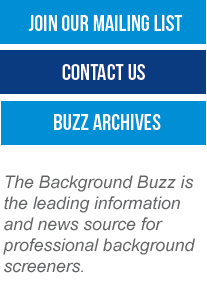

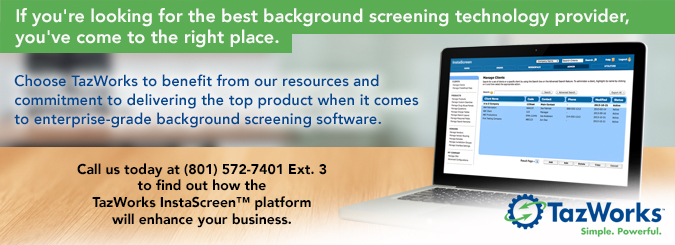

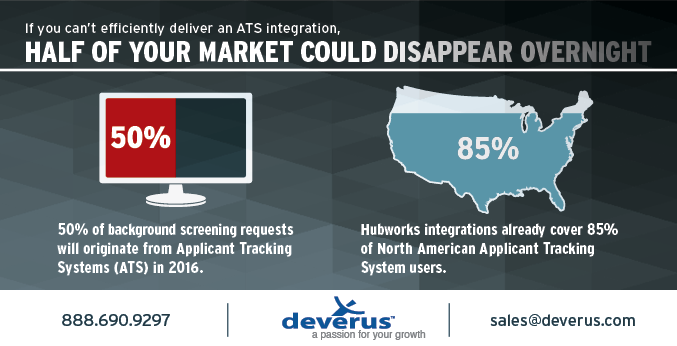
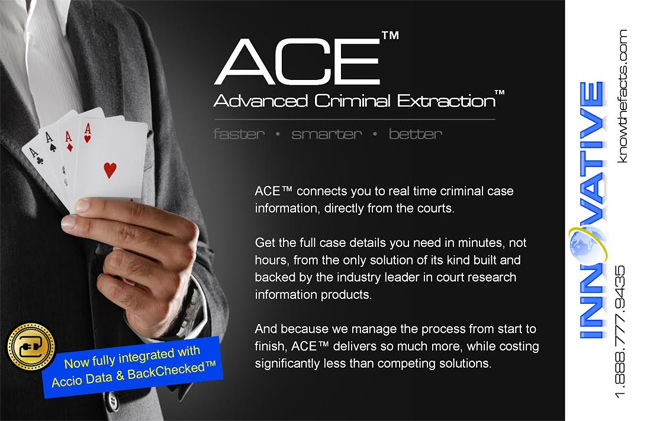



 Heidi Pattie Named Vice President at Convergence
Research
Heidi Pattie Named Vice President at Convergence
Research 
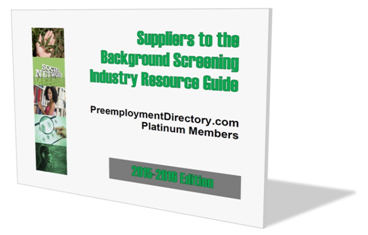
 Kevin Coy is a Partner in the Washington DC office of Arnall
Golden Gregory LLP. Kevin
Kevin Coy is a Partner in the Washington DC office of Arnall
Golden Gregory LLP. Kevin 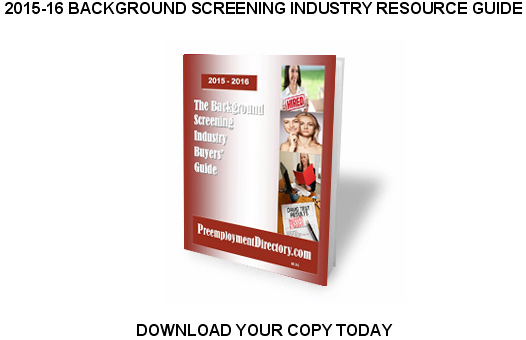
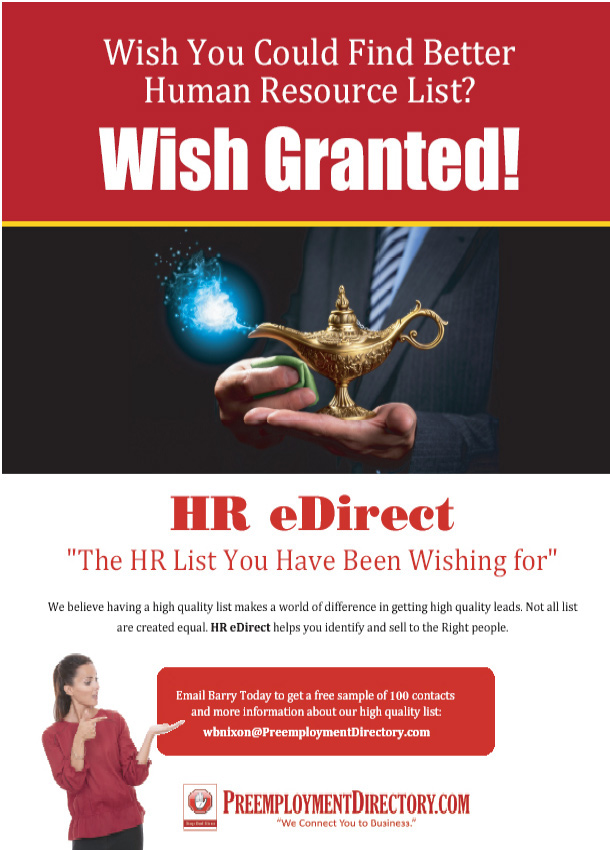


 Grab a latte and pull up a chair and join
us for a great interview with Ilya Krifman, Project Manager,
NIC Federal, Pre-Employment Screening Program
(PSP)
Grab a latte and pull up a chair and join
us for a great interview with Ilya Krifman, Project Manager,
NIC Federal, Pre-Employment Screening Program
(PSP) 
